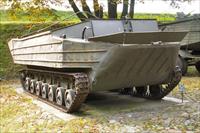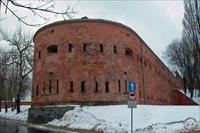MAP CONTROLS: Use slider or mousewheel to zoom, and hold down left mouse button
to drag.
KEY: Location markers are coloured from Green meaning exact to Red meaning
gone or unknown (details here)
|
Location Category ID:
|
16020
|
|
Added to Database:
|
July 2008
|
|
Last Edited:
|
8 April 2012
|
|
Address: |
Kaponiera, Cytadela Warszawska, 91-065 Warszawa
|
|
Telephone: |
22 687 82 95
|
|
Email: |
|
|
Opening Times: |
Closed.
|
|
Official Website: |
Muzeum Tradycji Wojsk Lądowych
|
|
Other Links: |
Museo.pl
Wikipedia.pl
Wikipedia.en
Army.mil.pl
|
|
Latitude, Longitude: |
52.261733
,
20.999183
|
|
Location Accuracy: |
10
|
|
Tanks Previously Here: |
|
The Cytadela Warszawska (Warsaw Citadel) is a 19th-century fortress built by order of Tsar Nicholas I after the suppression of the 1830 November Uprising in order to bolster imperial Russian control of the city. It is a pentagon-shaped brick structure with high outer walls, enclosing an area of 36 hectares. Its construction required the demolition of 76 residential buildings and the forcible resettlement of 15,000 inhabitants. In peacetime, some 5,000 Russian troops were stationed there. During the 1863 January Uprising, the garrison was reinforced to over 16,000. By 1863 the fortress housed 555 artillery pieces of various calibres, and could cover most of the city centre with artillery fire.
Well before the turn of the 20th century, it was apparent that such traditional fortifications had been made obsolete by modern rifled artillery. The Tsarist authorities had planned in 1913 to raze the fortress, but the process had not begun before the outbreak of World War I. In 1915 Warsaw was occupied by German forces with little opposition from the Russian garrison, which abandoned the fortress and withdrew east. The Germans blew up several of its structures, but the main part of the Citadel remained intact.
After Poland regained her independence in 1918, the Citadel was taken over by the Polish Army. It was used as a garrison, infantry training centre, and depot for materiel. During the 1944 Warsaw Uprising, its German garrison prevented Armia Krajowa units from the city centre from linking up with units from northern Warsaw’s Żoliborz district. The fortress survived the German occupation and in 1945 again became Polish Army property.
The Citadel houses the Muzeum Wojsk Lądowych (Museum of the Army), located in a two level artillery fort called the Kaponiera. The museum covers the history of the Citadel, and also includes a small collection of armoured vehicles and artillery. On 18 October 2006 the museum held a formal signing of a ‘Letter of Intent’ for the construction at the Citadel of a new headquarters for the Muzeum Wojska Polskiego. In addition to the museum moving here, so will the Military Historical Research Office, the Central Military Archives and the House of the Polish Soldier. The new Museum is to have 40,000 square meters of exhibition space with facilities; also planned are the reconstruction of the citadel, plus the construction of access roads and parking areas. The move is planned for 2013.
|
September 2007
|
| | | |  | | | | |
1: PTG tracked carrier
Taken: 7 September 2007
Contributor: R. Gucwa
Location Photo ID: 685
Added: 1 April 2012
Views: 142
Has Priority: 0
|
|
|
|
|
|
|
January 2007
|
| | | |  | | | | |
2: The Kaponiera bastion at the Citadel, photo by Z. Struck
Taken: 29 January 2007
Contributor: Wikimedia
Location Photo ID: 686
Added: 1 April 2012
Views: 192
Has Priority: 20
|
| | | | | |
|
|